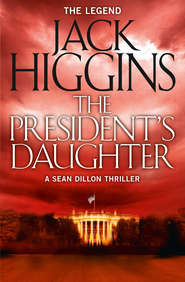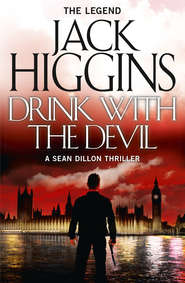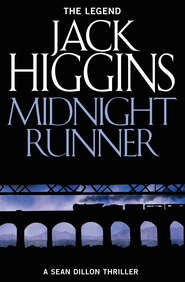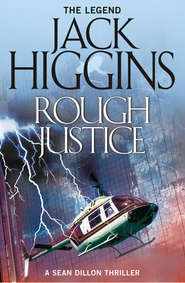По всем вопросам обращайтесь на: info@litportal.ru
(©) 2003-2024.
✖
The Valhalla Exchange
Автор
Год написания книги
2018
Настройки чтения
Размер шрифта
Высота строк
Поля
I motioned him to silence and moved to the entrance.
As Canning opened the door, I saw the cab from the airstrip outside, the driver waiting in the rain.
The general said, ‘You can take me to the hotel now,’ and closed the door behind him.
Hugo tugged at my sleeve. ‘Señor, what passes here?’
‘Exactly what I was wondering, Hugo,’ I said softly, and I went along the passage quickly and let myself out.
The cab was parked outside the hotel. As I approached, a man in a leather flying jacket and peaked cap hurried down the steps and got in. The cab drove away through the rain. I watched it go for a moment, unable to see if Canning was inside.
Rafael wasn’t behind the desk, but as I paused, shaking the rain from my coat, a door on my left opened and he emerged.
He smiled. ‘Were you successful, señor?’
‘Not really,’ I said. ‘Did I see the cab driving away just now?’
‘Ah, yes, that was the pilot of Mr Smith, an American gentleman who has just booked in. He was on his way to La Paz in his private aeroplane, but they had to put down here because of the weather.’
‘I see. Mr Smith, you say?’
‘That is correct, señor. I’ve just given him a drink in the bar. Could I perhaps get you something?’
‘Well, now,’ I said. ‘A large brandy might be a sensible idea, considering the state I’m in.’
I followed him, unbuttoning my trench-coat. It was a pleasant enough room, rough stone walls, a well-stocked bar at one side. Canning was seated in an armchair in front of a blazing log fire, a glass in one hand. He looked up sharply.
‘Company, señor,’ Rafael said cheerfully. ‘A fellow guest. Señor O’Hagan – Señor Smith. I’ll just get your brandy now,’ he added and moved away.
‘Not a night for even an old tomcat to be out,’ I said, throwing my coat over a chair. ‘As my old grannie used to say.’
He smiled up at me, the famous Canning charm well in evidence, and stuck out his hand. ‘English, Mr O’Hagan?’
‘By way of Ulster,’ I said. ‘But we won’t go into that, General.’
The smile stayed firmly in place, only the eyes changed, cold, hard, and the hand tightened on mine with a grip of surprising strength considering his age.
It was Rafael who broke the spell, arriving with my brandy on a tray. ‘Can I get you another one, señor?’ he asked.
Canning smiled, all charm again. ‘Later, my friend. Later.’
‘Señores.’
Rafael departed. Canning leaned back, watching me, then swallowed a little Scotch. He didn’t waste time trying to tell me how mistaken I was, but said simply, ‘We’ve met before, presumably?’
‘About fifteen minutes ago up the street at the mortuary,’ I said. ‘I was standing in the shadows, I should explain, so I had you at something of a disadvantage. Oh, I’ve seen you before at press conferences over the years, that sort of thing, but then one couldn’t really specialize in writing about politics and military affairs without knowing Hamilton Canning.’
‘O’Hagan,’ he said. ‘The one who writes for The Times?’
‘I’m afraid so, General.’
‘You’ve a good mind, son, but remind me to put you straight on China. You’ve been way out of line in that area lately.’
‘You’re the expert.’ I took out a cigarette. ‘What about Bauer, General?’
‘What about him?’ He leaned back, legs sprawled, all negligent ease.
I laughed. ‘All right, let’s try it another way. You ask me why a reasonably well-known correspondent for the London Times takes the trouble to haul himself all the way from Lima to a pesthole like this, just to look at the body of a man called Ricardo Bauer who dropped dead in the street here on Monday.’
‘All right, son,’ he said lazily. ‘You tell me. I’m all ears.’
‘Ricardo Bauer,’ I said, ‘as more than one expert will tell you, is one of the aliases used by Martin Bormann in Brazil, the Argentine, Chile and Paraguay on many occasions during the past thirty years.’
‘Martin Bormann?’ he said.
‘Oh, come off it, General. Reichsleiter Martin Bormann, Head of the Nazi Party Chancellory and Secretary to the Führer. The one member of Hitler’s top table unaccounted for since the war.’
‘Bormann’s dead,’ he said softly. ‘He was killed attempting to break out of Berlin. Blown up crossing the Weidendammer Bridge on the night of May 1st, 1945.’
‘Early hours of May 2nd, General,’ I said. ‘Let’s get it right. Bormann left the bunker at 1.30 a.m. It was Erich Kempka, Hitler’s chauffeur, who saw him come under artillery fire on that bridge. Unfortunately for that story, the Hitler Youth Leader, Artur Axmann, crossed the Spree River on a railway bridge, as part of a group led by Bormann, and that was considerably later.’
He nodded. ‘But Axmann asserted also that he’d seen Bormann and Hitler’s doctor, Stumpfegger, lying dead near Lehrter Station.’
‘And no one else to confirm the story,’ I said. ‘Very convenient,’
He put down his glass, took out a pipe and started to fill it from a leather pouch. ‘So, you believe he’s alive. Wouldn’t you say that’s kind of crazy?’
‘It would certainly put me in pretty mixed company,’ I said. ‘Starting with Stalin and lesser mortals like Jacob Glas, Bormann’s chauffeur, who saw him in Munich after the war. Then there was Eichmann – when the Israelis picked him up in 1960 he told them Bormann was alive. Now why would he do that if it wasn’t true?’
‘A neat point. Go on.’
‘Simon Wiesenthal, the Nazi hunter, always insisted he was alive, maintained he had regular reports on him. Ladislas Farago said he actually interviewed him. Since 1964 the West German authorities have had 100,000 marks on his head and he was found guilty of war crimes at Nuremberg and sentenced to death in his absence.’ I leaned forward. ‘What more do you want, General? Would you like to hear the one about the Spaniard who maintains he travelled to Argentine from Spain with Bormann in a U-boat in 1945?’
He smiled, leaning over to put another log on the fire. ‘Yes, I interviewed him soon after he came out with that story. But if Bormann’s been alive all these years, what’s he been doing?’
‘The Kameradenwerk,’ I said. ‘Action for comrades. The organization they set up to take care of the movement after the war, with hundreds of millions of gold salted away to pay for it.’
‘Possible.’ He nodded, staring into the fire. ‘Possible.’
‘One thing is sure,’ I said. ‘That isn’t him lying up there at the mortuary. At least, you don’t think so.’
He glanced up at me. ‘Why do you say that?’
‘I saw your face.’
He nodded. ‘No, it wasn’t Bormann.’
‘How did you know about him? Bauer, I mean. Events in La Huerta hardly make front-page news in the New York Times.’











